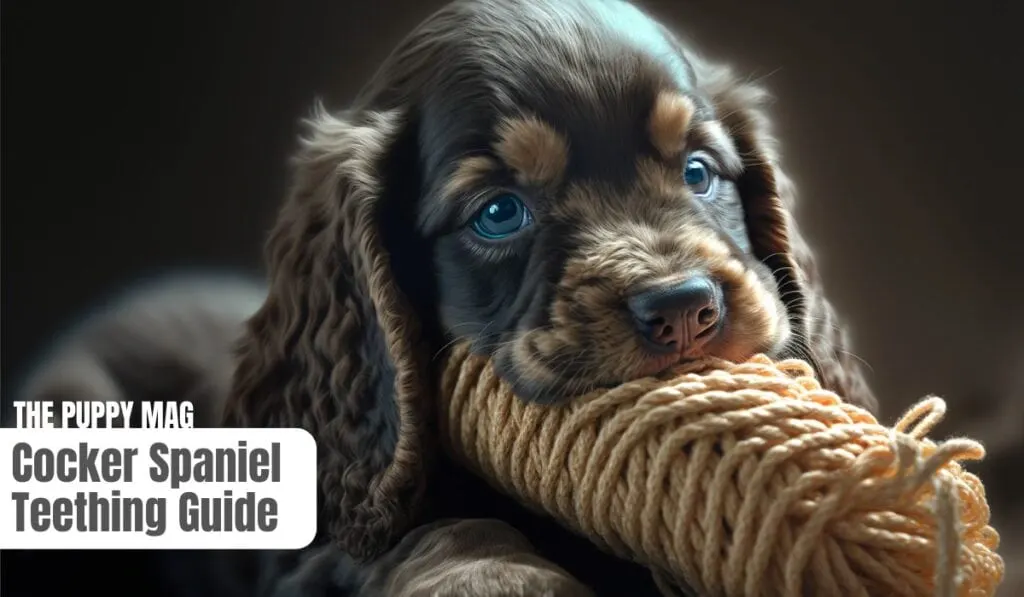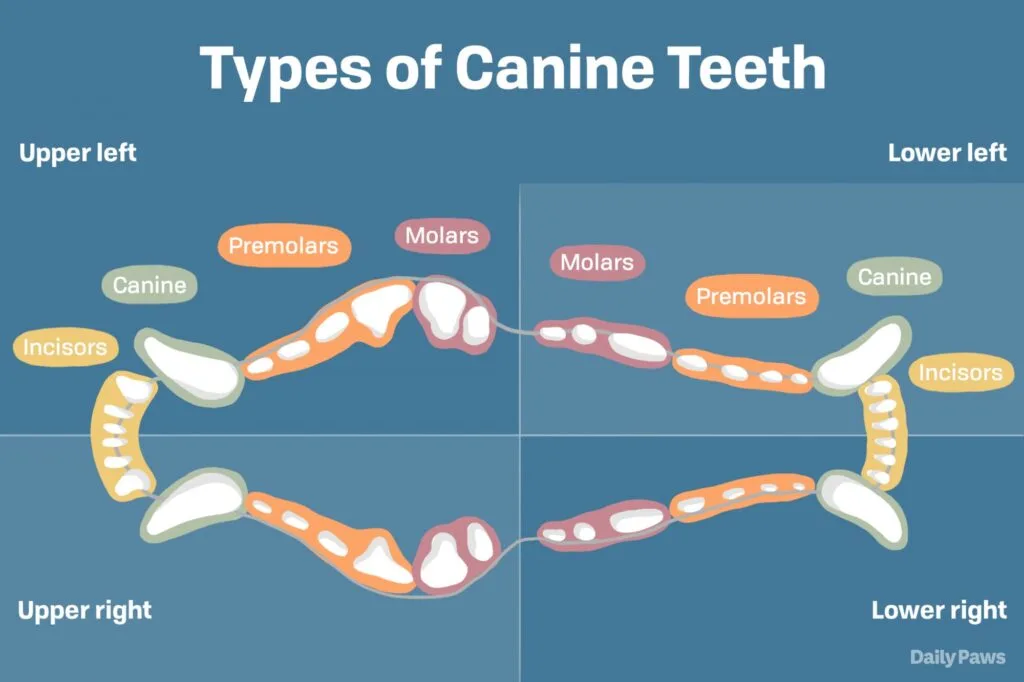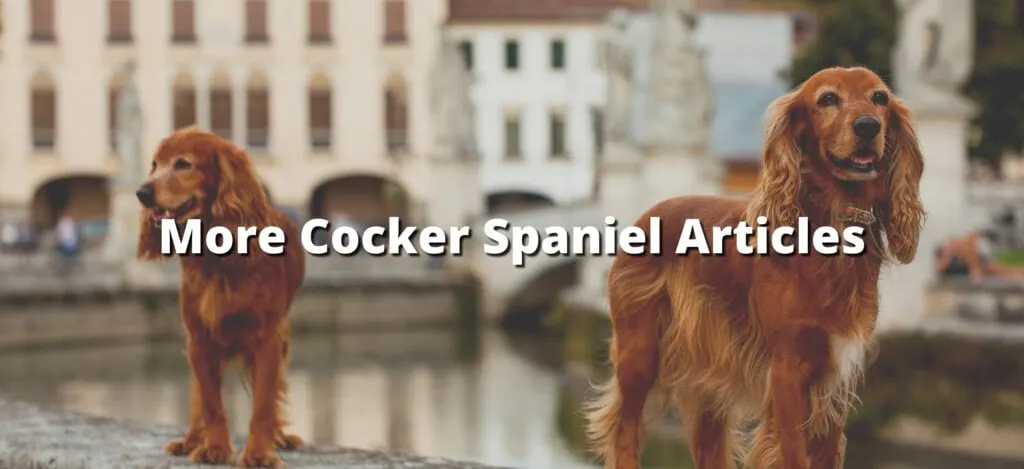There are many great questions about cocker spaniel teething, from when their baby teeth will come out, to when teething will stop completely.
This article covers everything owners need to know about cocker spaniel teething. Let’s get into it!

Cocker Spaniel Teething
Teething is a grueling period, whereby your cocker spaniel will want to bite and chew everything they can to relieve their itchy, tingling, and inflamed gums.
Although teething can be a challenge for both the owner and the dog, with the correct advice and tips it doesn’t have to be so bad.
Just remember to be extra patient with your cocker spaniel, correct and redirect unwanted biting and use this is a great opportunity to teach and instill good bite inhibition.
When Do Cocker Spaniels Lose Their Baby Teeth?
Cocker spaniels lose their baby teeth (deciduous teeth) starting from around 12 weeks old.
It can take several weeks to a few months for all baby teeth to come out completely. And it may not be a smooth ride.
Plenty of biting and chewing will allow the deciduous teeth to come out successfully and in good time. So it’s essential to allow the biting and chewing to happen but to ensure you redirect it when your pup inevitably tries chewing something they shouldn’t!
When Do Cocker Spaniels Get Their Baby Teeth?
Those little razor-sharp gnashers come out at about 3 weeks of age. So this means your cocker spaniel will have their baby teeth while still with the breeder.
It’s a good idea to take a thick rag or soft chewy puppy toy when you collect your puppy. At 8 weeks, their teeth are sharp, and teething has started. Redirection training needs to start asap.
When Does Start Teething?
Teething starts in cocker spaniels from about 3 weeks old when their baby teeth start pushing through. This marks the start of teething.
Most think teething starts when cocker spaniels get their first adult teeth, but this isn’t true. It happens way before owners even get their pup.
Extra Info: VCA Hospitals Teething
How Long Do Spaniels Teeth For?
Cocker spaniels teeth for 6-8 months. Some spaniels will finish teething “early” by 6 months, and others can take up to 8 months.
Teething is never a smooth ride and how long it takes can be affected by their routine, chewing habits, and genetics.
If your spaniel hasn’t finished teething by 8-9 months and is still missing some adult teeth it’s a good idea to schedule a vet appointment to have a check up.
While it’s not a huge cause for concern if your spaniel is late in teething, it’s best to get your vet’s opinion.
How Many Teeth Do Cocker Spaniels Have?
Cocker spaniels, like all dogs have 28 baby teeth, followed by 42 adult teeth.
The 42 adult teeth are comprised of:
- 12 Incisors (small teeth at the front)
- 4 Large canines
- 16 Premolars
- 10 Molars

How Cocker Spaniels Handle Teething
As explained above, teething is a challenging and frustrating process for many puppies.
It will cause their gums to itch, tingle, inflame and ultimately cause quite a bit of pain and discomfort.
How teething affects cocker spaniels:
- Elevated chewing and biting habits
- Difficulty maintaining attention during training
- Mood fluctuations and irritable behavior
- Increased misbehavior
- Excessive drooling
- Alteration in eating habits
- Occasional bleeding from the gums
👉 It’s also important to know that teething activity comes in waves. Some weeks teething will be bad, resulting in all these adverse effects. Whereas other weeks there will be little teething activity, and your spaniel’s behavior will reflect that.
Why Your Spaniel Bites & Chews During Teething
Your spaniel will want to bite and chew everything in their path during teething. This is very similar for all breeds, but spaniels are known for being extra mouthy.
But why does this happen? and how should owners respond?
🎯 The act of biting and chewing will help relieve the itchy sensation that’s caused during teething, plus it’ll increase blood flow to the area, ultimately helping the entire process.
It’s safe to say that all the biting and chewing is a GOOD THING for teething. Just not your hands or furniture…
Redirect Biting and Chewing
Redirection training for biting and chewing needs to start asap while your cocker spaniel teeths.
Not only will this save your hands and furniture, but it sets up good bite inhibition for th rest of their life.
Don’t make the mistake of ignoring their biting and chewing. Owners MUST use this time to properly train their spaniel to bite and chew only things you allow, like their toy.
The goal isn’t to stop the biting and chewing completely. It’s to redirect the chewing to something appropriate.
The basic principle for redirecting biting and chewing is as follows:
- Give a firm “No!” just loud enough to startle them and gain attention. (owners do not need to shout, it’s all about the tone of voice).
- Redirect and SHOW your puppy what they should be biting, like their chew toy. Related: Puppy Biting Only One Owner.
- Watch your puppy focus on the toy for at least several seconds.
- Reward your puppy for having kept their attention on the toy.
It’s crucial to ensure your puppy focuses on their toy for several seconds before you reward them. You don’t want your pup to accidentally think you’re rewarding them for chewing the wrong thing.
As mentioned before, not only is this crucial to saving your furniture, but it’s one of the most valuable and essential training periods of your puppy’s life. By instilling good biting behavior at a young age, you’ll ensure you don’t have this issue when your spaniel is an adult (which is a much more challenging issue to deal with).
A Good Tip To Help Teething Spaniels
A good tip a friend told me about handling teething puppies is to go frozen. Yep, freeze everything! Their treats, toys, and even put ice cubes in their water.
Try freezing damp rope toys, peanut butter stuffed kong toys, and even whole bananas or carrots.
Having plenty of outlets to chew on is the key to avoiding unwanted chewing habits.
The idea of freezing the items is purely to help reduce the inflammation and pain caused by the teething. This will improve your spaniel’s mood and make teething easier for them.

